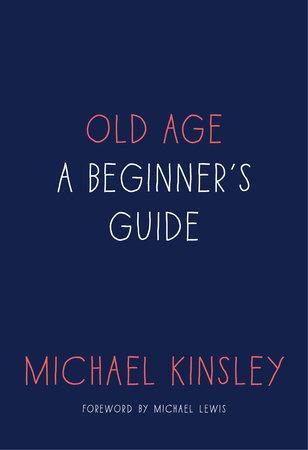Excerpt
Old Age
1
An Encounter in the Pool
At first I thought I was alone in the pool. It was a sparkling blue gem of a pool, implausibly planted in the skyscraper canyon of downtown Los Angeles, as if David Hockney, heading toward Beverly Hills, had taken the wrong exit on the I-10 freeway. This fine pool was the consolation and only charm of the Soviet-style apartment complex where I lived so that I could walk to work at the Los Angeles Times. I never sleep anymore--an almost universal boomer complaint--so it was early, not even 6 a.m. I had finished my laps and was enjoying the emptiness of the pool, the faint sounds of downtown gearing up for the day, and the drama of the looming office towers. As we learned on September 11, they really can fall down on top of you. But they wouldn’t on that day. I felt healthy and smug.
Then, what I had thought was a ripple in the water turned out to be--no, not a shark with John Williams music hectoring from a boom box in its stomach. It was a tiny old man in a tiny black bathing suit. He was slowly, slowly completing a lap in the next lane. When, finally, he reached the side where I was resting and watching, he came up for air. He saw me, beamed, and said, “I’m ninety years old.” It was clearly a boast, not a lament, so I followed his script and said, “Well, isn’t that marvelous” and “You certainly don’t look it” and on in that vein. He beamed some more, I beamed, and briefly we both were happy--two nearly naked strangers sharing the first little dishonesties and self-deceptions of a beautiful day in Southern California.
Perhaps sensing, correctly, some condescension in my praise, the old man then stuck out his chest and declared, “I used to be a judge.” And I started to resent this intruder in my morning and my pool. Did I now have to tell him how marvelous it was that he used to be a judge? What was so fucking marvelous about it? What was his point? But even as he said this about having been a judge, a panicky realization of its absurd irrelevance seemed to pass across his face, and then a realization of its pathos. When he was a judge--if indeed he had been a judge--he had not felt the need to accost strangers and tell them that he was a judge. And then he seemed to realize that he had overplayed his hand. He had left this stranger in the pool thinking the very thought he had wanted to dispel: The old fool is past it. And finally (I imagined, observing his face) came sadness: He had bungled a simple social interchange. So it must be true: He was past it.
A few weeks after The New Yorker published a short article I wrote based on this anecdote about the old man in the pool--or should I man up and say two old men in the pool?--the magazine ran a response in its correspondence section that may be of some interest to people who are nicer than I am:
The unnamed gentleman whom Michael Kinsley describes in the first paragraphs of his article on longevity was my grandfather. . . . Every day at 5:30 a.m., he swam in the pool at the “Soviet-style complex” in downtown Los Angeles where Kinsley encountered him one morning. My grandfather, Richard Ibanez, was in his nineties, as he told Kinsley, at that time, and had served for twenty years as a Los Angeles County Superior Court judge. If my grandfather had seen Kinsley’s article, he would have pointed out that longevity is the wrong metric by which to judge one’s life. It is not the length of life that is the “only competition that matters”; rather, it is the manner in which one lives that should properly be used to judge one’s worth. My grandfather lived every day to the fullest because he loved his fellow-men for all their shortcomings as well as for their great creations. He took pride in the length of his life not merely because of its length but because he was passionate about life and desired to teach others about the value of their own lives. For his sake, I am glad that Kinsley is still in the “competition.” Sadly, my grandfather is not. He died last November--but he swam in that pool every morning until the last week of his life.




